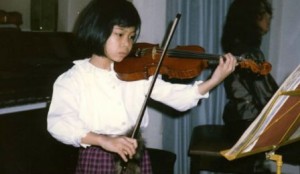by: Georg Predota, Interlude

Vanessa Mae
The “Tiger mom phenomenon,” a term coined by Yale law professor Amy Chua in 2011, describes an age-old system of strict authoritarian motherly control that is supposed to propel children towards excellence. Advocates suggest that it produces an exceptionally high proportion of top performers in a variety of academic and musical areas. Skeptics blame the system for inflicting a host of chronic mental health and psychiatric problems, including a high suicide rate amongst Asian children aged 5 to 12! As you might well imagine, the musical universe is full of ambitious parents who will do whatever it takes to see their sons or daughters succeed. But you don’t have to take my word, just ask Singaporean-born British violinist and alpine skier Vanessa-Mae, who openly confessed that her mother Pamela Tan-Nicholson frequently used serious physical violence and humiliation to improve her violin playing. “She regularly hits me violently across the face and body for less than perfect performances. Everything was geared towards focusing me on my violin career,” Mae has said. “If I didn’t play a piece perfectly, my mother–and often my music teacher also—would resort to slapping me.
